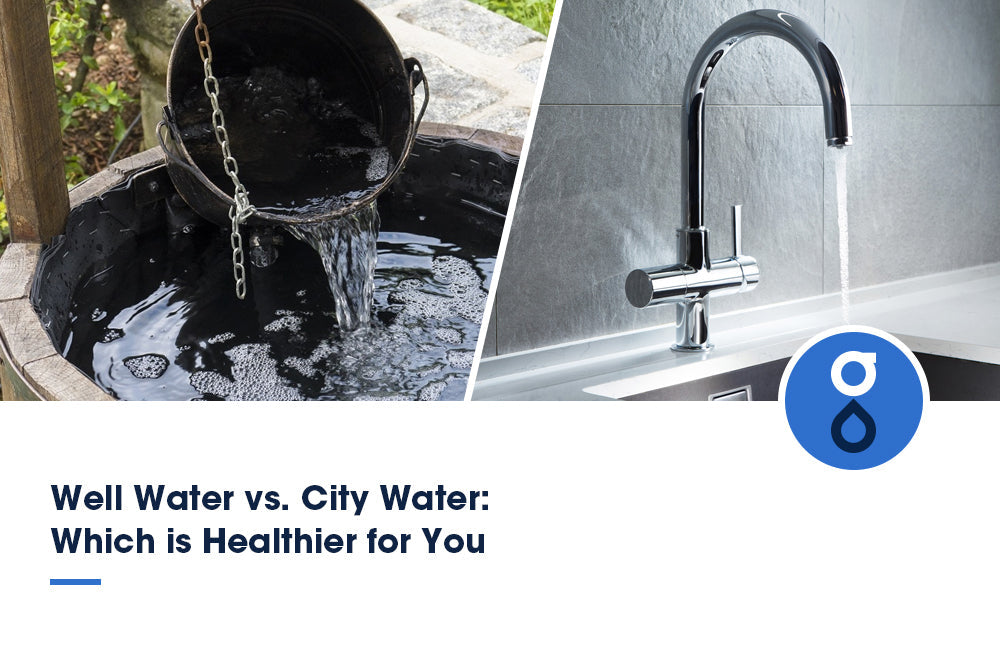Table of Contents:
Differences between well water and city water
Pros and cons of well water for health
Pros and cons of city water for health
Five things to consider when choosing well water VS city water
Glacier Fresh water filters: safeguard your water safety
FAQs
Conclusion
Is well water or city water healthier for you and your family? In this article, we will explore the differences between well water and city water and discuss the pros and cons of each in terms of health. By understanding the factors contributing to water quality, you can decide which option is best for you.
Differences between well water and city water
Source and purity
You may be surprised to discover the stark contrasts between the purity of well water and the chemical-laden nature of city water. Well water, sourced from underground aquifers, is known for its natural filtration process and lack of chemical additives. On the other hand, city water undergoes extensive treatment before it reaches your tap, often involving the addition of various chemicals to kill bacteria and remove impurities.
Contamination degree
Well water contamination is a concern that many city dwellers don't have to worry about. Since well water is sourced from deep underground, it's less likely to be contaminated by surface pollutants. However, this is only sometimes the case, as wells can still be susceptible to contamination from nearby septic systems, agricultural runoff, or industrial activities. Regular testing is essential to ensure the safety of well water.
City water treatment involves multiple steps to make it safe for consumption. This includes the addition of chemicals like chlorine to kill harmful bacteria and viruses. While these treatments effectively eliminate potential health risks, they can also leave an unpleasant taste and odor behind. Some city water systems add fluoride to promote dental health, while others may have trace amounts of other minerals.
Accessibility
One advantage of well water is its accessibility. If you own a private well, you have direct control over your water quality. You can monitor and test it regularly to ensure its purity. In contrast, city water is supplied to a large population, making it challenging to guarantee the same level of quality control. However, city water undergoes rigorous testing by water authorities to meet safety standards and is generally considered safe for consumption.
Pros and cons of well water for health

One advantage of using well water is that it can provide a more natural and mineral-rich option for maintaining a healthy lifestyle. Unlike city water, which undergoes extensive treatment, well water comes directly from underground sources. This means it is less likely to contain harmful chemicals such as chlorine or fluoride, commonly added to city water. By drinking well water, you can enjoy the benefits of consuming water in its purest form, with all its natural minerals intact.
To further emphasize the advantages of well water for your health, here are four key points to consider:
· Better hydration
Well water typically tastes fresh and clean, making it more appealing to drink. This can encourage you to stay hydrated throughout the day, essential for overall health and well-being.
· Rich in minerals

Well water often contains beneficial minerals such as calcium, magnesium, and potassium, essential for various bodily functions. These minerals can contribute to healthy bones, teeth, and muscles and support proper nerve function.
· Reduced exposure to contaminants
City water is susceptible to contaminants, such as heavy metals, pesticides, and pharmaceutical residues, which may enter the water supply. On the other hand, well water is less likely to be exposed to such pollutants, providing a cleaner and safer option.
· Minimal purification methods
Since well water is sourced underground, it doesn't require extensive purification processes like city water. This means it retains more of its natural properties, making it a healthier choice for consumption.
While well water offers several advantages for your health, it's important to note that it also carries some risks. Contaminants such as bacteria, viruses, and certain chemicals can still find their way into well water without proper precautions. Regular testing and maintenance of the well system are crucial to ensure the water remains safe for consumption.
Additionally, live in an area with a high risk of contamination. It may be necessary to invest in additional purification methods, such as UV sterilization or reverse osmosis, to guarantee the safety of your well water.
Pros and cons of city water for health

City water undergoes rigorous testing and regulations to ensure its quality, making it a reliable choice for many individuals. The controlled environment and treatment processes help minimize the risk of contamination, ensuring that you receive clean and safe water. To further emphasize the advantages of city water for your health, here are three key points to consider:
· Consistent quality.
Municipalities have strict regulations to monitor and maintain water standards, ensuring it meets all safety requirements. These regulations include regular testing for contaminants, such as bacteria, heavy metals, and chemicals. By adhering to these regulations, city water providers can ensure that your water is free from harmful substances, reducing the potential adverse effects on your health.
· Strict water treatments

Another advantage of city water is the treatment processes it undergoes. Water treatment plants use advanced filtration techniques, such as activated carbon filters, and disinfection methods, like chlorination, to remove impurities. These processes effectively eliminate bacteria, viruses, and other pathogens that may be present in the water supply. As a result, city water is generally considered safer and less prone to causing waterborne illnesses than well water.
· Health benefits
City water offers numerous benefits for your health. It's regulated and monitored nature ensures its quality and reduces the risk of contamination. The treatment processes employed by water treatment plants effectively remove impurities, making it a safe choice for staying hydrated and supporting your overall well-being.
However, city water, while convenient, may pose potential health risks. One of the main concerns is the presence of chemicals such as chlorine and fluoride. While these chemicals are used to treat and disinfect the water supply, excessive exposure can have adverse effects on our health. Chlorine has been linked to an increased risk of certain types of cancer and respiratory issues, while fluoride, although proven to prevent tooth decay, may have long-term effects on bone health.
Aside from health concerns, rising water bills and reliance on aging infrastructure are additional factors to consider. With increasing water rates, homeowners may have to allocate more of their budget toward monthly water expenses. Additionally, aging water infrastructure can lead to leaks and breaks, potentially causing contamination and disruptions in the water supply.
Five things to consider when choosing well water VS city water
When deciding between well water and city water, there are essential factors to consider to make an informed choice about your water source.
Water quality
Water quality testing is vital when choosing between well water and city water. With well water, it is your responsibility to test and monitor the quality of the water regularly. This ensures that drinking and using it for various household activities is safe.
On the other hand, city water undergoes regular testing and treatment by the local water authority. They must meet specific standards for water quality, which provides reassurance that the water is safe to consume. However, it's important to note that even with city water, occasional issues may arise, so staying vigilant about water quality is crucial.
Potential health risks
Well water can be susceptible to contamination from various sources, such as pesticides, fertilizers, or nearby septic systems. It's crucial to regularly test well water for bacteria, heavy metals, and other harmful substances. On the other hand, city water may contain disinfectants like chlorine, which can have health implications. Researching and understanding the specific health risks associated with both options is necessary to make an informed decision.
Cost-effectiveness
Water is less expensive in the long run, as you won't have to pay monthly water bills. On the other hand, city water may require a higher upfront cost for installation and connection fees. It's crucial to weigh these financial considerations and determine what fits best within your budget.
Maintenance requirements
Wells require regular maintenance, including inspections, pump checks, and cleaning. This can be time-consuming and may require professional assistance. On the other hand, city water generally requires less maintenance since the local water authority manages it. However, depending on your specific needs, you may still need to install and maintain water filters or softeners.
Environmental effects
Well water is generally considered more environmentally friendly since it doesn't require the use of treatment facilities or extensive transportation networks. This can help reduce carbon emissions and energy consumption. Additionally, relying on well water means less strain on the municipal water supply, which can be particularly beneficial during times of drought or water scarcity.
Glacier Fresh water filters: safeguard your water safety

Protect your water safety with water filters, ensuring clean and pure drinking water for you and your family. When it comes to water purification methods, Glacier Fresh activated carbon water filters offer an effective solution. These filters use advanced technology to remove impurities and contaminants from your water, providing a safe and healthy drinking experience. Filtered water offers numerous benefits over unfiltered water.
Common water contaminants include chlorine, lead, pesticides, and industrial pollutants. These substances can adversely affect your health, from gastrointestinal to long-term health problems. Using a Glacier Fresh activated carbon water filter, you can effectively remove these contaminants and ensure your drinking water is free from harmful substances.
Water safety is paramount, as it directly affects your health and well-being. Choosing the right water filter is crucial in maintaining water safety. Glacier Fresh water filters are designed to meet the highest quality and performance standards. They're easy to install and require minimal maintenance, providing you with a hassle-free experience. With Glacier Fresh water filters, you can have peace of mind knowing you're drinking clean and pure water.
FAQs
How does the taste of well water compare to that of city water?
Several factors come into play when it comes to the taste comparison of well water versus city water. Ultimately, consumer preferences play a significant role in determining which water tastes better. Some people may prefer the natural flavor of well water, while others may find city water more appealing.
Are there any specific contaminants commonly found in city water that could impact health?
Long-term exposure to these contaminants can lead to various health issues, including gastrointestinal problems, respiratory conditions, and certain types of cancers. However, it's important to note that cities have implemented water quality standards and filtration systems to ensure that the water is safe to drink.
Conclusion
In conclusion, there are certain factors to consider when it comes to the debate of well water versus city water. Well water can provide a more natural water source, free from the additives and chemicals often found in city water. However, it may be more susceptible to contamination and require regular testing and maintenance.
On the other hand, city water undergoes extensive treatment processes to ensure its safety, but it may still contain traces of chemicals and contaminants. Both options have pros and cons, but ultimately, it depends on your preferences and circumstances.
















